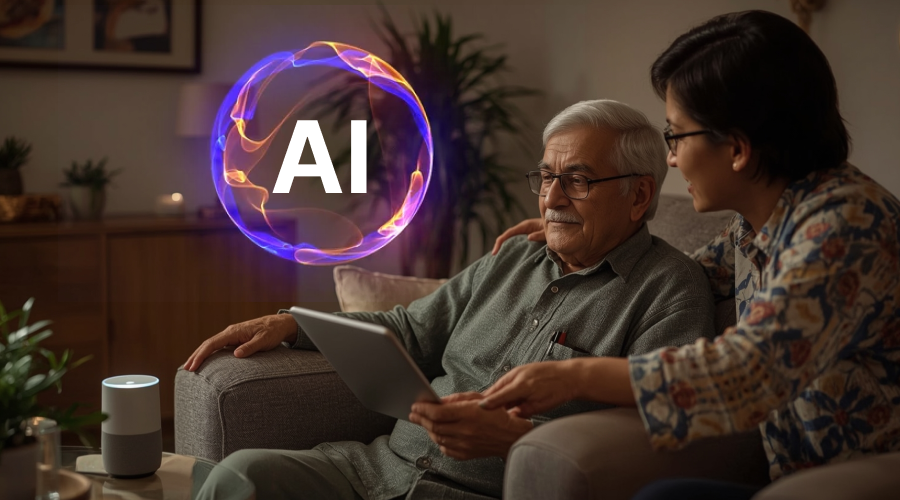Robots & AI in Elder Care: Will Your Parent Ever Be Cared for by a Bot?
From sci-fi fantasy to real-life nursing homes, robots, and AI-powered assistants are quickly becoming part of the elder care conversation. But how realistic is the idea of a bot caring for your aging parent? And more importantly—is it safe, reliable, or even welcome in Indian households?
Let’s break down what’s already happening in the world of tech-enabled care, the benefits, concerns, and where things stand in India.
What Does “AI in Elder Care” Actually Mean?
AI isn’t just about humanoid robots walking around with trays of chai (yet). In elder care, it includes:
- Smart voice assistants (like Alexa, and Google Nest) that set medication reminders or call family
- Fall detection & emergency sensors embedded in floors, walls, or wearables
- AI chatbots that monitor mood, offer companionship and detect speech changes
- Caregiving robots that help with movement, hygiene, or simply offer conversation
Globally, robots like “ElliQ” in Israel or “Paro” the seal robot in Japan are already providing daily support and companionship to the elderly.
Benefits: Why Families Are Paying Attention
1. 24/7 Support Without Burnout
Bots don’t sleep. From alerting family during a fall to gently reminding parents to take their BP medicine, AI systems are always “on.”
2. Loneliness Fighters
Social robots can talk, respond to questions, and even share jokes. In countries like Japan and Sweden, they’re proven to reduce depression and loneliness in seniors.
3. Safe Independence
With the help of smart home sensors, elderly individuals can continue living alone safely—doors lock automatically, stoves switch off, and SOS alerts are triggered when needed.
4. Personalized Care Tracking
AI tools can learn from patterns—detecting subtle changes in walking speed, speech, or sleep that may signal early health issues.
But What About the Concerns?
1. Emotional Disconnect
Many Indian families worry that robotic care may reduce the real human touch—something seniors deeply value.
“A robot can’t feel my mother’s emotions when she’s had a rough day,” one Delhi-based son said.
2. Privacy Worries
Smart cameras and sensors can feel intrusive. Unless clearly explained and consented to, seniors may feel like they’re being “watched.”
3. Cost & Accessibility
High-end robots like Japan’s “Robear” or the US’s “ElliQ” are expensive and not yet widely available in India. However, more affordable AI solutions are emerging.
What’s Happening in India?
- Tata Elxsi & IITs are exploring elderly-assistive robots for mobility and monitoring.
- Startups like Emoha, Alserv, and Agewell Foundation integrate AI tools for remote care, health alerts, and companionship.
- Affordable solutions like Alexa-based eldercare routines and fall-detection mats are gaining popularity in urban homes.
Want to see a demo?
Cities like Bangalore, Pune, and Delhi NCR have begun showcasing AI eldercare tools in local tech expos and gated societies. Keep an eye out for:
- Healthcare tech fairs
- AI hubs like IIIT-Hyderabad or C-CAMP Bangalore
- Demos through eldercare providers like Senior Care Joy (coming soon!)
So, Will a Robot Replace Your Parent’s Caregiver?
Not likely—at least not completely.
AI and robots can be excellent companions, early-alert systems, and assistive helpers, but they can’t fully replace the warmth of human caregiving. The future of elder care in India lies in hybrid models—where AI supports human caregivers, not replaces them.
Final Thoughts: Embrace, Don’t Replace
Think of AI and robots in elder care as you’d think of a good home appliance or health app:
- They assist, monitor, and relieve pressure from families and caregivers.
- But the emotional bond, empathy, and intuition still come from real people.
Want to Explore AI Options for Your Parents?
Senior Care Joy is working to bring smart care tools, vetted human support, and personalized solutions under one roof—so your parents can age gracefully, safely, and joyfully.

